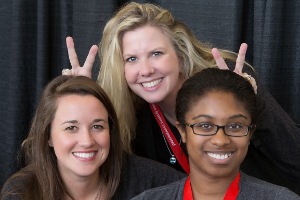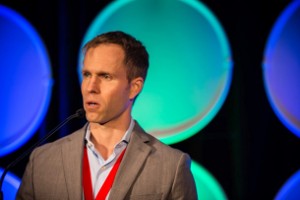I spent the summer of ’67, the Summer of Love, in Raleigh, North Carolina. Although the hippie thing hadn’t yet made it there, the city was still cool and somewhat hip, even though at first glance it appeared to be little more than just another sleepy southern capital, flush with tobacco money and not quite sure about the end of state-sanctioned segregation, which was just getting underway. Nearly fifty years later, Raleigh still has cool cred, although time has changed it greatly.

Last year I returned to Raleigh for pretty much the first time since the sixties to attend All Things Open (ATO) and saw hardly any evidence of the city I’d known nearly a half century ago. That was okay — time marches on. What I saw was vibrant and moderately hip, in a nerdy, geeky sort of way. I was conferencing, so I expected to see the city’s geek side — which I did in spades. So much so that I began to get the idea that Raleigh had morphed into something of an open source Silicon Valley.
But, again, I was hanging out with an open source crowd at an open source conference and perhaps my viewpoint was skewed. So a few weeks ago I put the question to Todd Lewis, the chairperson for ATO. Like me, he doesn’t live in Raleigh, but I’m willing to guess that in recent years he’s spent a lot more time there than I.
“In economic development terms, you’ve got areas with a high concentration of a particular type of industry called ‘clusters,'” he explained, in answer to my question, “and it’s well known that clusters attract other like businesses. In the case of Raleigh, Durham and Research Triangle Park, I think you’ll see this effect really come into its own over the next five years.”
Lewis doesn’t usually do simple “yes” or “no” answers; first, he wants to explain how he reaches his conclusions. The way I was reading it, he was leading up to a qualified “yes.”
“No region can become Silicon Valley, of course,” he added. “There’s only one. But this area has a very good opportunity to stake its claim as the ‘open source’ center of innovation and leadership.”
As I thought, a qualified yes.

Last year had been ATO’s first outing, its inaugural run, and I’d gathered from conversations with staff that Lewis and his team went into opening day with fingers crossed, not knowing if the conference they’d put together would fly in a city which had never had a conference — at least not one of the scope and magnitude being attempted here.
From all indications, the event was a success. I’ve heard that something like 800 people showed up.
“The turnout last year was better than expected, yes,” Lewis said. “I attribute that to a couple things, including the quality of speaker that participated and the overall concentration of ‘open’ related companies and technologists in the area. The RTP has a very sophisticated technology population that ‘got’ the content we offered in 2013. I think they honestly appreciated the quality and the effort we put into coordinating the event and sessions.”
Indeed, at the close of last year’s event, a grateful Lewis thanked the attendees for the big turnout and vowed to make ATO the premiere open source event on the East Coast. From looking at this year’s schedule, it would seem that he’s been working to keep this promise. This year’s conference features nearly twice the number of speakers, and the number of tracks has also been expanded. He and his team have also tweaked the event’s focus.
“The conference this year will differ from 2013’s in a couple of ways,” he explained. “The first you mentioned — more tracks and sessions. The second is a higher level of sophistication and overall quality of content. While 2013 was off-the-charts good in this capacity, I can honestly say this year’s lineup is one of the best I’ve seen at a regional conference — ever.”
Lewis pointed out that there’s been other additions to this year’s event as well. For starters, there’s a Women in IT/Open Source panel discussion, which will delve into the under-representation of women in the IT workforce and talk about ways to encourage more women to choose tech and open source career paths. This discussion will feature a panel of six, moderated by DeLisa Alexander, an executive vice president and the Chief People Officer at Red Hat, who’s also slated as an ATO keynote speaker.
“We’re also hosting Meet-the-Speaker sessions,” Lewis added, “where attendees can meet with and talk to select speakers as well as get books signed. This should make the experience even better for anyone attending.”
Last year’s speakers’ roster included representatives from many of open source’s most well known and respected organizations and projects. Presenters included folks from Maria DB, Drupal, Mozilla, Joomla and many other important open source projects.
There were also companies that most FOSS advocates would consider to be bad apples. Oracle was there, mainly for technical discussions on MySQL and Java, as was a representative from Redmond, who tried to make the case that “Microsoft is an open source company.” There were also some wolves-in-sheep’s-clothing present, such as a rep from an “open core” company who belittled any “kumbaya” aspects to open source. To him, it was all about getting clients hooked on proprietary add-ons.
A legitimate question might be: why? Why invite companies that have spent years putting roadblocks in open source’s path or that callously use open source licenses to sell proprietary software? Lewis believes this to be part of the “open” in open source, that if we truly believe in “openness’ then we should put our money where our mouths are and be as open as the proprietary crowd is closed.
“I personally believe separation often causes trouble between people and contributes to an overall lack of understanding,” he said. “I also believe that reasonable people can disagree on similar topics — and that’s okay. We want to encourage honest and open dialogue between everyone, regardless of where you might come down on any particular issue. I don’t mean to sound political, but we honestly believe this. Communication is absolutely key, and there’s not enough of it in today’s society, and even within the tech sector.”
Actually, I enjoyed watching Microsoft’s spokesperson squirm while trying to make the case that “Microsoft is an open source company” before an audience that was politely not buying it. I also found it somewhat enlightening to watch an open core company show its true colors, revealing itself to be a proprietary firm merely riding the open source bandwagon. As for Oracle, developer level technical discussions on Java and MySQL can only be beneficial.
My only reservation about ATO has nothing to do with the inclusion of proprietary players at the speakers’ podiums, but with the fact that the conference, so far, has offered little for those who use and support FOSS while remaining outside the world of big business. There’s really nothing there for the “everyday Linux user,” or for mom and pop businesses that could benefit greatly by leveraging FOSS solutions instead of remaining dependent on the likes of Microsoft.
Lewis said that he and his team are aware of this lack and have already began taking remedial steps, which will be evident in 2015. Simply put: “Future changes will include expanding tracks to include more content relative to users, not just ‘open’ content within the context of business or the enterprise.”
When looking ahead to 2015 and beyond, Lewis echoed his earlier assertion that ATO will be positioned as a “premiere” open source event. “A few things are in the works now that will hopefully enable this in 2015,” he said, “including putting together a speaker committee. We’ll announce 2015 dates at the conference this year and we’ll make a major announcement about changing the date format a bit and utilizing more floor space. For those paying attention, it will signal rather clearly where we hope and plan to take ATO.”
Christine Hall has been a journalist since 1971. In 2001, she began writing a weekly consumer computer column and started covering Linux and FOSS in 2002 after making the switch to GNU/Linux. Follow her on Twitter: @BrideOfLinux











Excellent article. So good, I read it again.
Isnt this part of MS campaigns for years now? Take over the focus of events. And its a guarantee to get negative feedback from participants. It ALWAYS does. So why allow someone to disrupt the message.
I randomly took an article form a dozen years ago and there are many of the kind: http://archive09.linux.com/feature/27727
And I find the reasoning kind of insulting as to why enemies of FLOSS should be given the floor so they can overtly lie.
This isnt a question of different opinion but off helping promoting a company which has been openly working to undermine Linux and free software.
Do the gays bring over to their shindigs people who think what they do is disgusting?
Does Apple have convinced anti-Apple individuals at theirs?
Heck, does MS invite FLOSS activists to their events to promote free software?
MS interest in FLOSS is strictly about themselves, its not about being part of the communities it sues, slanders, attacks, threathens, etc.
Any MS conversation starts with “Does your company still consider that Linux has stolen hundreds of their IP?” and you have follow up questions for either answers.
Imagine you invite me to dinner to your house while Im openly telling the world that you are a pedophile who should be arrested. Youd have to be an idiot to invite me.
Lewis reasoning is pathetic and as I said before pretty insulting because it brings the decades long attack on FLOSS by Microsoft to a simple “let’s agree to disagree”.
I guess using that logic jews should invite palestinians at their shindigs as well.
Im not holding my breath that the gays, jews, apple fanbois and others will follow the ATO logic.
But then again, Im not a fan of ‘open’. The term has lost all meaning just like green has (Shell is a ‘green’ company you know). I get a lot more pissed off when this happens and it has often, in Linux conferences.
Those who dont learn from history are doomed to repeat it.
Those who believe corporate BS deserve their fate because of their gullibility.